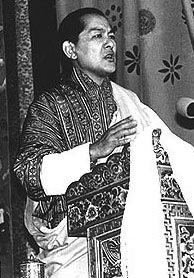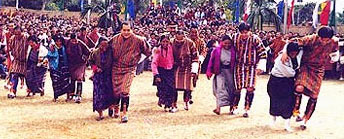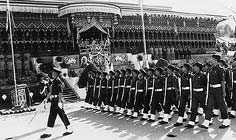 |
Bhutan
Politics |
|
 |
Bhutan
Information |
|
|
 |
|
The
King addressing the nation
|
 |
|
His
Majesty the King's National Day Speech in Samtse 2002
|
 |
| As
our people are aware, the Ninth Five Year Plan begins from this year. Not
including the expenditure for power projects and establishment of industries,
the development budget outlay for the Ninth Plan is Nu. 70 billion. On
behalf of the government and people of Bhutan, I would like to express
our deep appreciation and gratitude to our close friend and development
partner India, to other friendly donor countries, and to the international
organisations who are extending their generous assistance for the socio-economic
development of our country.
We
have many important objectives to achieve during the Ninth Plan. Among
them the most important is the devolution of power to the dzongkhag and
geog development committees. The financial outlay for development activities
in the dzongkhags and geogs, not including the central programmes and projects,
is Nu. 17 billion. |
|
There are 2,914 elected representatives of the people
in the 20 dzongkhag yargye tshogdus and 201 geog yargye tshogchungs in
the country.
With the devolution of administrative and financial powers
to the development committees, it is of utmost importance that our people
elect the best and most capable representatives as members of the dzongkhag
yargye tshogdus and the geog yargye tshogchungs.
We
must keep in mind that the extent of progress and development achieved
in the villages, geogs and dzongkhags of Bhutan will depend upon the role
and participation of the people in implementing the programmes and objectives
of the Ninth Plan.
In
the world today, we see many countries facing political, social, and economic
problems. In Bhutan since the devolution of executive powers to the prime
minister and council of ministers of the lhengye zhungtsho in 1998, the
elected Cabinet has provided good governance for the country. I would like
to express our appreciation to the council of ministers for discharging
their responsibilities well over the last four and a half years.
By
June next year, it will be time for registering a vote of confidence in
the elected ministers of the lhengye zhungtsho. I would like to mention
that, as our country is developing rapidly, and the work load of the government
is increasing to fulfill the aspirations of the people and meet the emerging
challenges, new ministries will have to be established and the council
of ministers would likewise have to be expanded.
Once
the lhengye zhungtshog is expanded and strengthened with a new mandate
to govern, thereafter, in keeping with the decision of the 80th session
of the National Assembly, we will hold talks with the militants who have
established camps inside Bhutan. During the talks, it will be our objective
to ensure that the militants remove their main camp, which serves as their
headquarter, from Bhutanese territory. If our efforts to resolve this problem
peacefully do not yield results, and the militants from Assam and North
Bengal refuse to leave our country through the process of peaceful dialogue,
we will be left with no option but to use our military forces to remove
them from Bhutan. This will result in war and it is very important for
all of us to be fully aware that in such a situation the security of the
country will be threatened. We will have to face loss of lives and economic
hardship and all sections of Bhutanese people will be seriously affected.
In
November this year, the first draft of our Constitution was completed by
the constitution drafting committee. I would like all of you to know that
the Constitution is not a gift from the King to the people. It is, however,
the sacred responsibility of the King, the government and the people of
our 20 dzongkhags to bring forth a Constitution that will serve the best
interests of our country. I would like to inform you that the drafting
committee presented the first draft of the constitution to me about a week
back.
The Constitution will be finalized in close consultation with our
people. I will be studying the draft carefully and we will do our best
to ensure that a very good draft constitution is then distributed to the
20 dzongkhags. I will be personally visiting the dzongkhags with the members
of the drafting committee to discuss with our people and ensure that your
views are incorporated in the draft before it is forwarded to the National
Assembly.
It is important for the government and the people to work closely
together in bringing forth a constitution that will fulfill the aspirations
of the Bhutanese people, promote our national interest, safeguard Bhutan's
security and sovereignty, and provide a strong foundation for a political
system that is most suitable and beneficial for both the present and future
well being of our people and country.
| With
the success achieved in our education sector, a large number of our children
are studying in schools established all over the country. It is estimated
that in the next five years about 50,000 of our youth will have to be provided
with employment. Therefore, the government has attached high priority to
human resource development in the Ninth Plan. |
 |
A budget of Nu. 3 billion
has been allotted to provide job related training in the government and
the private sector.
As
our country progresses on the path of socio-economic development, it is
important to provide gainful employment to our people.
The
objective of providing full and useful employment can only be achieved
through the establishment of industries and the development of the private
sector. In this regard, it is necessary to make greater efforts in strengthening
and developing the private sector, and for the government and the private
sector to work together, hand in hand, to provide good employment opportunities
to the youth of Bhutan. After exhorting our youth in the schools to study
hard and serve the country well when they grow up, it would all be pointless
if we cannot provide them with good jobs. One of the important responsibilities
of the government is to ensure that a small country like Bhutan will never
have to face unemployment problems. Every effort must be made to ensure
that the Bhutanese people will always be able to find gainful employment.
At
present Bhutan has only one airfield, in Paro. Even though it cannot be
used by big planes, the Paro airport has greatly benefited our people and
country. However, as our country progresses it is necessary to have a bigger
airport to facilitate the growth in trade and export of our commodities.
While feasibility studies had been carried out, it was not possible to
build an international airport on sites identified earlier as they were
located in areas in the south which are facing security problems from the
ngolops and the militants. The government has, therefore, decided to establish
an international airport at Sha Khotokha during the 9th plan.
It is very
important for Bhutan to overcome the transportation problems of a small,
landlocked country. The construction of an international airport at Khotokha
is necessary to meet the future requirements of our people and country
and we will have to look for external assistance to establish this airport.
As in the past, when the Paro airport was constructed, we are confident
that our close friend India will provide full assistance in the establishment
of the Khotokha airport.
In
our country, about 80 percent of our people depend on agriculture for their
livelihood. Therefore, in order to increase the income of our farmers,
it is important for the government to provide land kidu to people who do
not have adequate agricultural land. Since 1974, the government had implemented
102 resettlement schemes for landless people and those who were dependent
on tseri cultivation. As our people are aware, most of the resettlement
schemes were implemented for the kidu of the southern Bhutanese people.
On the auspicious occasion of our National Day, I am happy to announce
that the government will be allotting land to 600 families with inadequate
agricultural landholdings. In order to ensure the success of development
activities in the rural areas, it is necessary for the government to ensure
that kidu land is allotted to people who have insufficient land and to
those who are dependent on shifting cultivation.
 |
As
you know, some of our landless people in the north have been resettled
on land available in the south. Today, when our country is going through
a difficult and challenging period, this should not be a cause for doubts
or alarm for anyone so long as the people resettled are genuine citizens
of our country. If the land that is available in the south is left fallow
and unoccupied, there is a serious danger of them being taken over by the
ngolops and the militants from across the border. |
Looking
after and retaining possession of our land and territory, whether in the
south or in the north, is of utmost importance for ensuring the security
and sovereignty of our country which is the responsibility of every Bhutanese
citizen.
In
many parts of the world today millions of people are facing serious problems
and hardship from disease, famine, and war. In Bhutan, we are fortunate
to be able to enjoy the benefits of peace, stability, and progress. We
must never take such blessings and good fortune for granted. It is important
for the government and people to always strive selflessly to ensure the
progress and well being of our country, and to serve and protect the glorious
Pelden Drukpa, particularly when our nation is facing a difficult period.
I
am very happy today to be able to celebrate our National Day together with
our people like members of one family. On this happy and auspicious occasion,
I would like to express my Tashi Delek to all our people in the 20 dzongkhags
of Bhutan.
| His
Majesty informed the public that, after seeking the views of the people
across the country, the Constitution of the kingdom of Bhutan would be
finalised to establish the legal foundation for governance by the people.
His Majesty commended the serving government for providing good governance
since their election in 1998 and informed the people that the number of
ministries would be expanded next year. |
 |
The
government, said His Majesty, would hold peaceful negotiations with the
Indian militant groups, which were illegally camped on Bhutanese soil.
If
they refused to remove the main camp which was used as their headquarter,
the government would have no choice but to use military force to remove
them from Bhutan. Announcing the resettlement of 600 landless families,
His Majesty said it was important to provide livelihood and improve the
well being of the 80 percent of the population which depended on agriculture.
| Contributed
by Kinga Dema for KUENSEL, Bhutan's national newspaper, 2002 |
 |
| more
information |
 |
|






